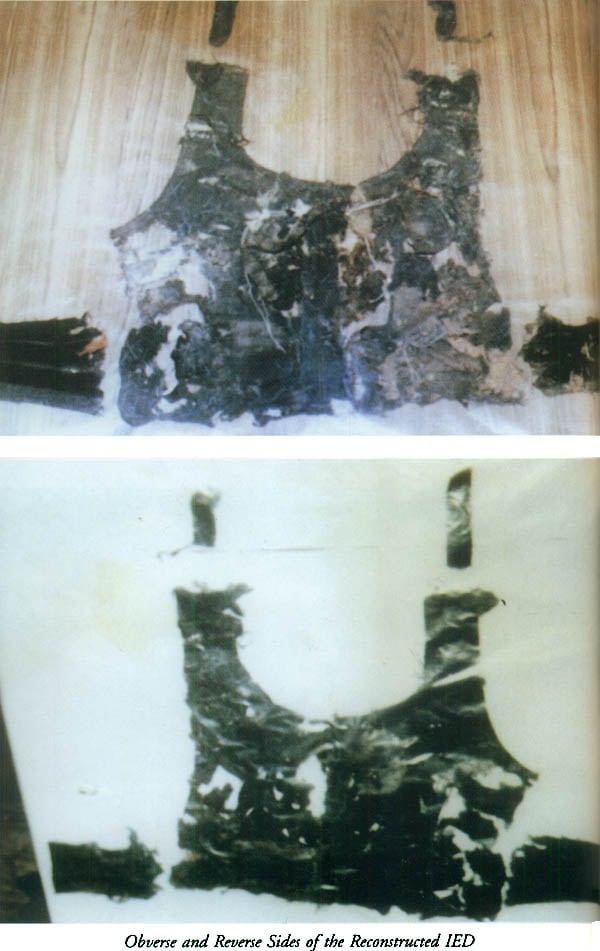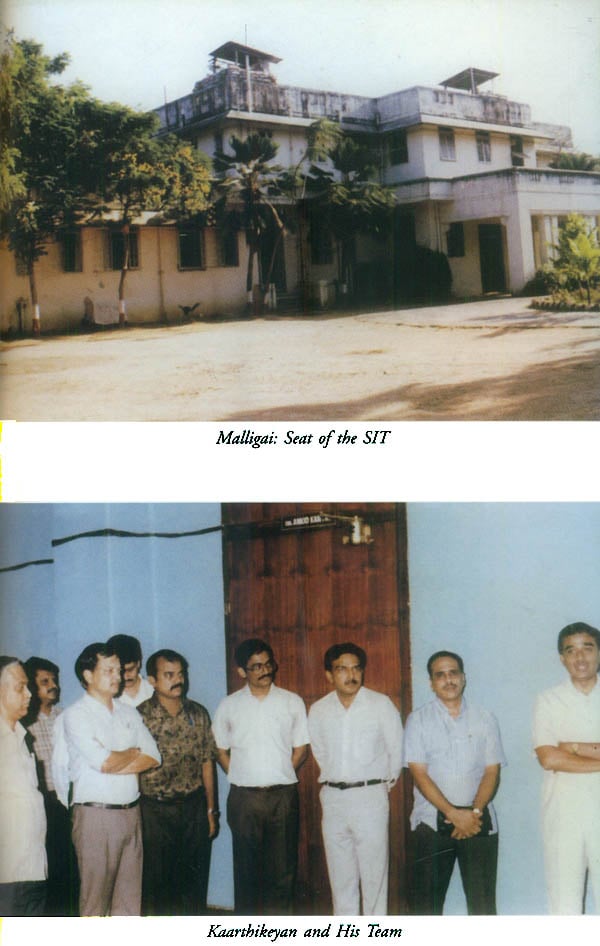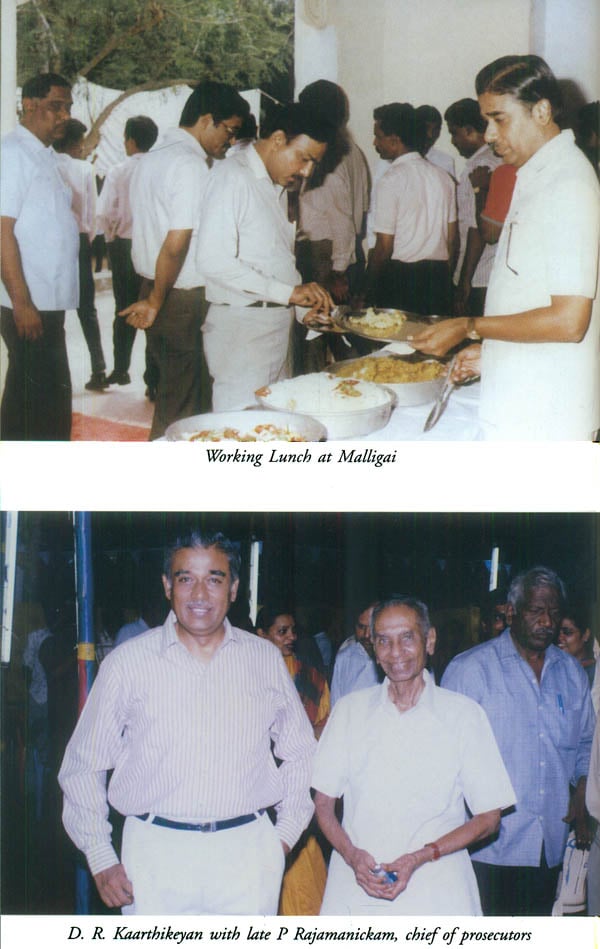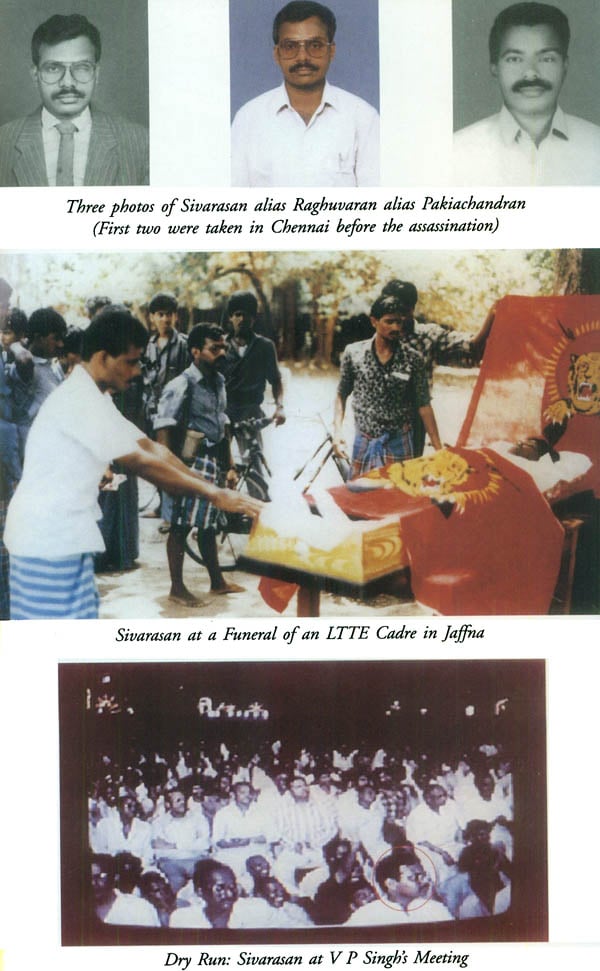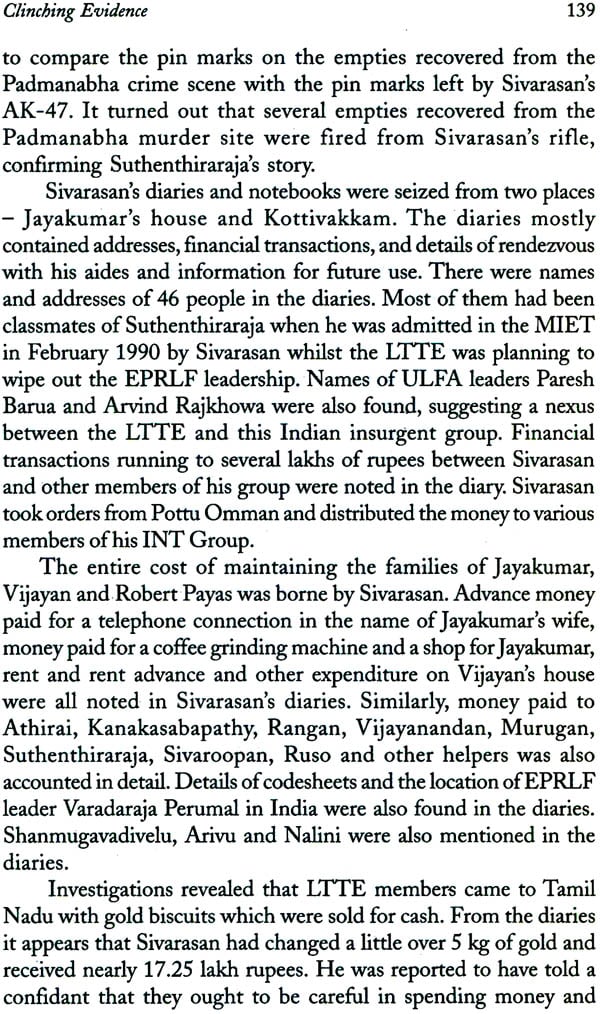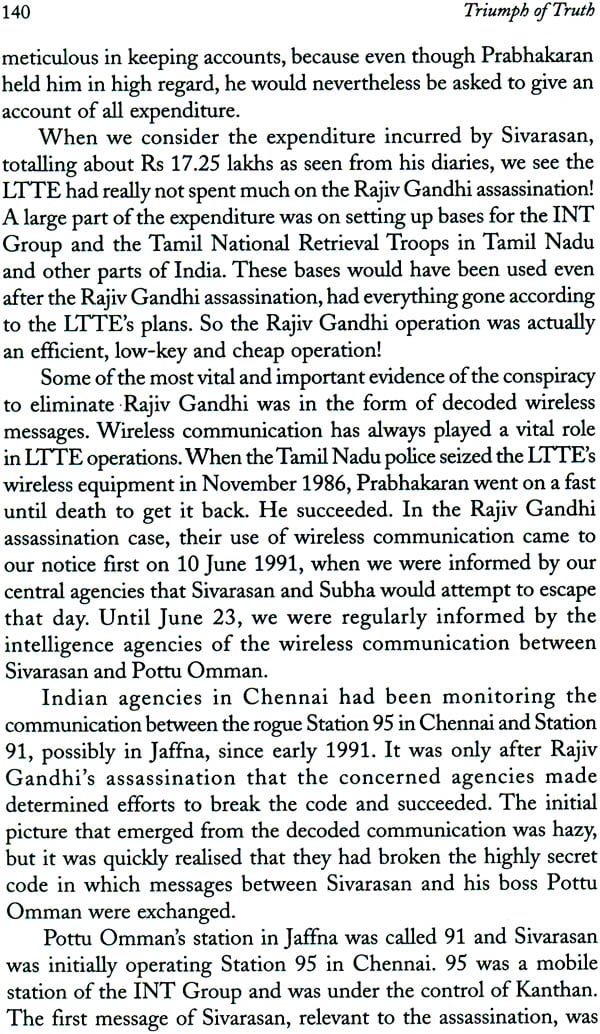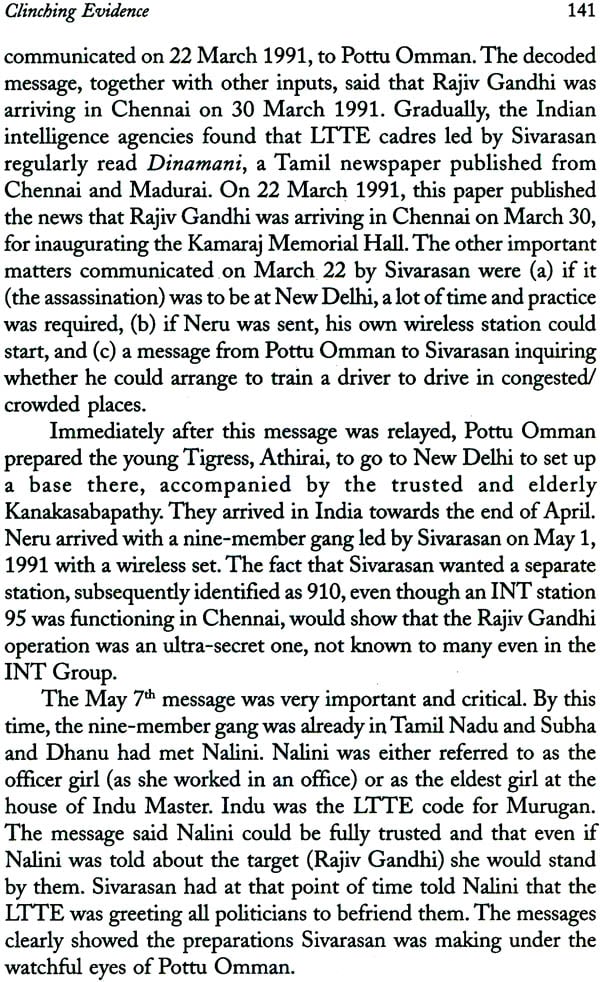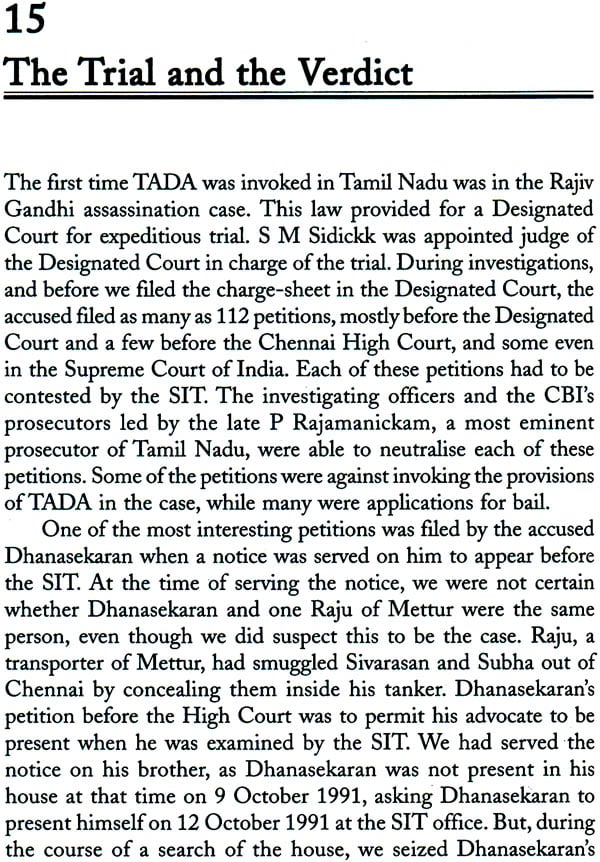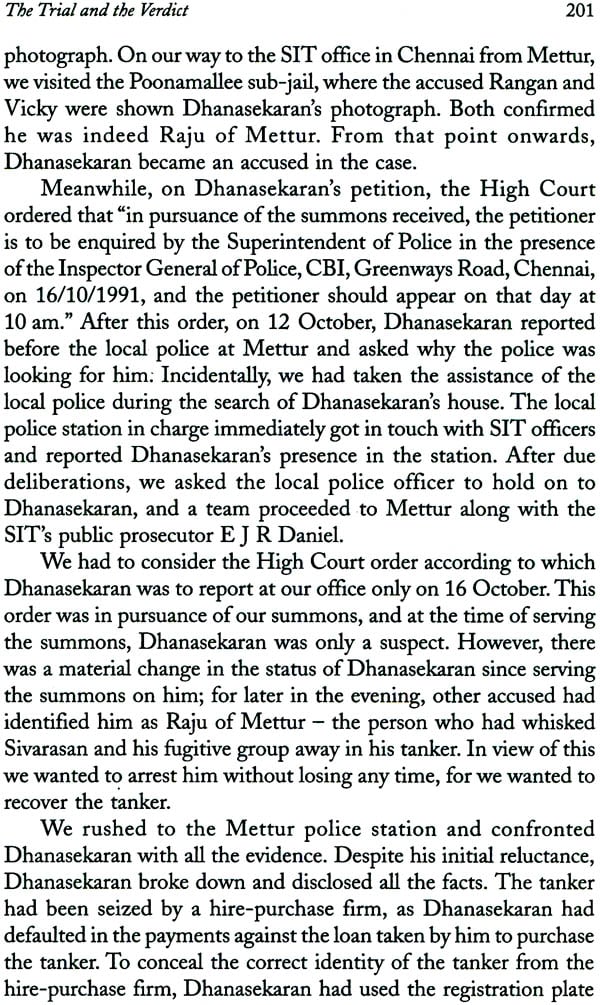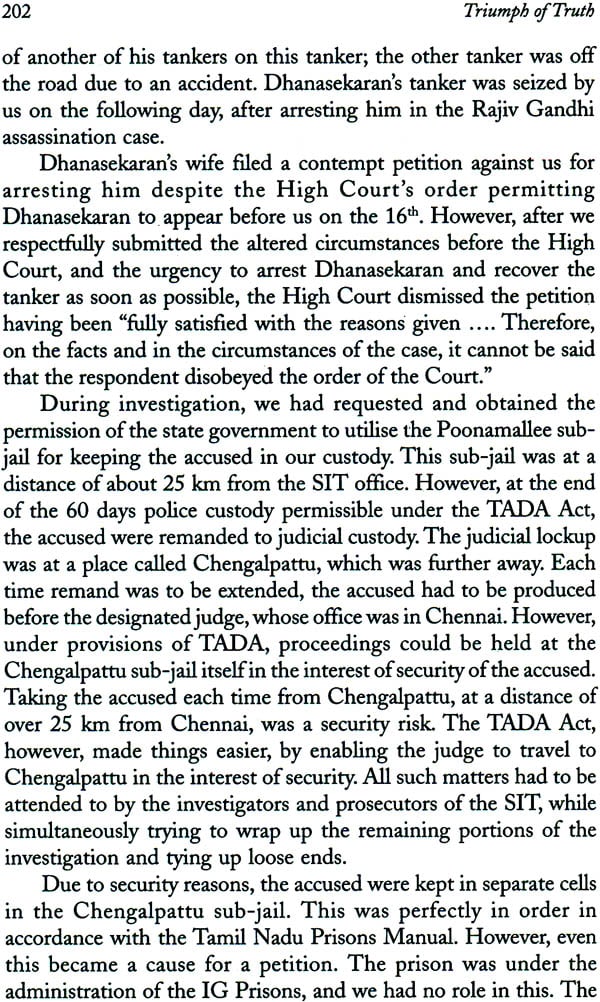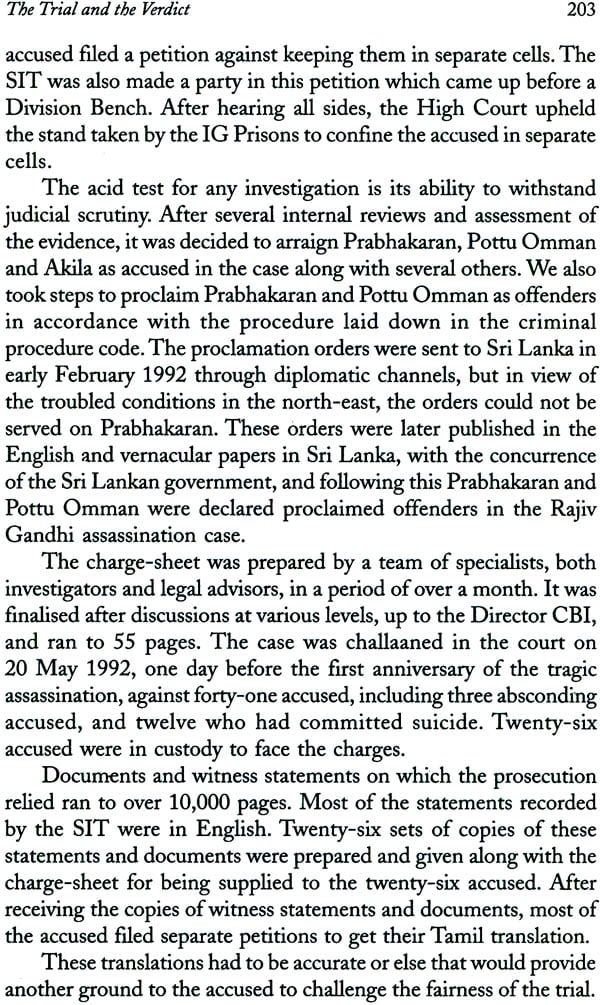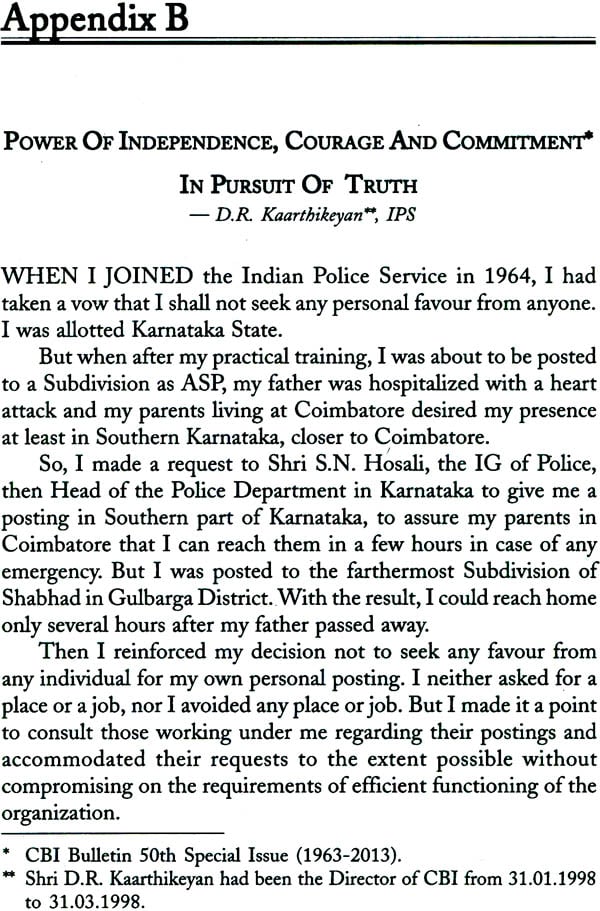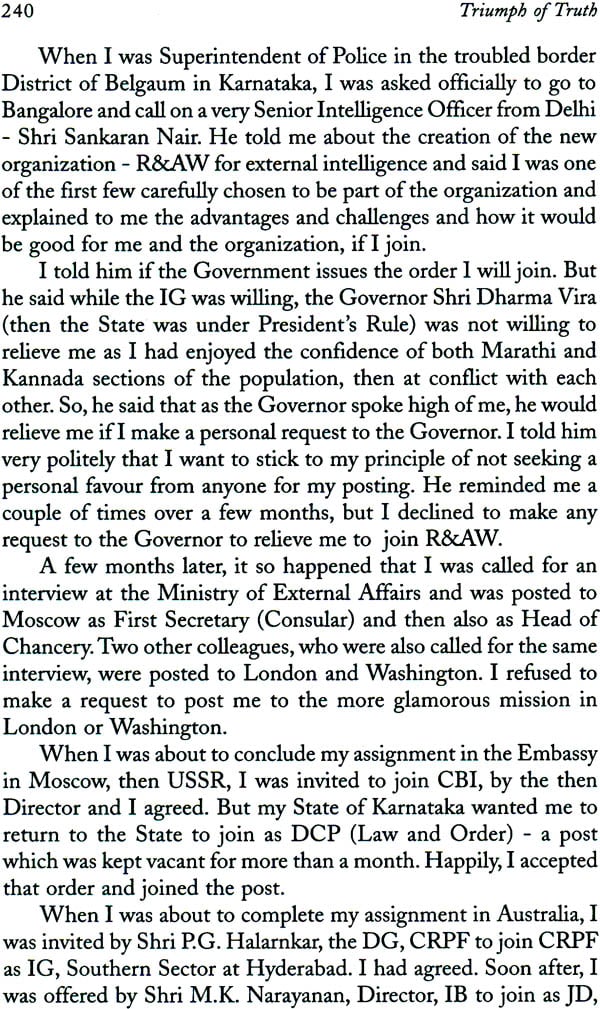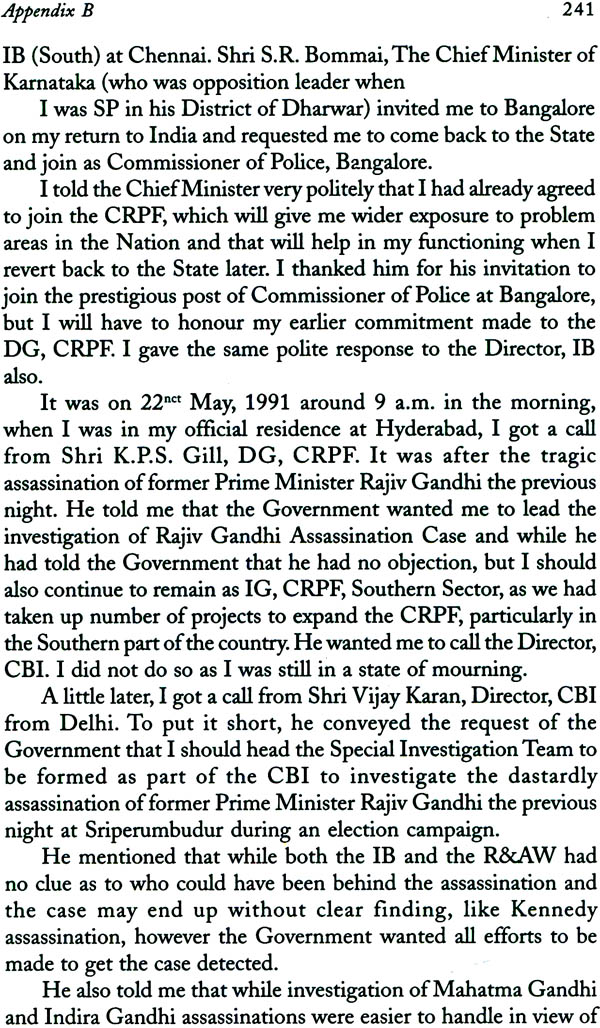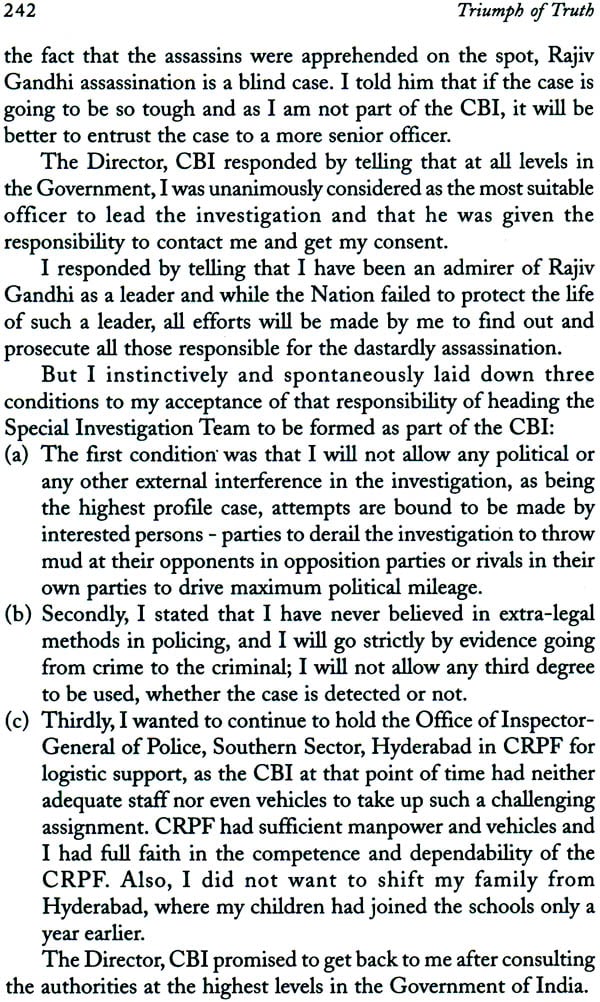
Triumph of Truth The Rajiv Gandhi Assassination The Investigation
Book Specification
| Item Code: | IDJ419 |
| Author: | D. R. KAATHIKEYAN & RADHAVINOD RAJU |
| Publisher: | STERLING PUBLISHERS PVT. LTD. |
| Language: | English |
| Edition: | 2014 |
| ISBN: | 9788120790339 |
| Pages: | 286 (Illustrated Throughout in Color) |
| Cover: | Hardcover |
| Other Details | 8.3" X 5.3" |
| Weight | 390 gm |
Book Description
Back of the Book
Why? How?
An infamous murder. It was 10.20 pm on 21 May. The year was 1991. A woman bowed Respectfully. Her arm reached out to touch his feet. Suddenly there was an explosion. The deafening sound, the clouds of smoke, the shattered bodies, the blood and gore.
Follow the trail. Follow the trial. Follow the story to know the truth.
This book unfolds the gripping story-at once fascinating and grim-of perhaps the first case of assassination of a world-class leader by a human bomb.
There was a general demand for explanation and action. The totallay blind case with enormous ramifications needed skilled, dexterous and professional investigation. D.R. Kaarthikeyan was called upon by the Government of India to unravel the mystery.
This assassination profoundly influenced political developments in India and altered the course of contemporary history in India and Sri Lanka.
D.R. Kaarthikeyan, chief of the Special Investigation Team constituted to investigate the Rajiv Gandhi assassination case, is a lawyer turned police officer who has had a brilliant and richly varied career.
After joining the elite Indian Police Service in 1964 he has held several key positions including District Superintendent of Police, Director, Police Training Academy, Chief of Intelligence and Security, Karnatak; Head of chancery, Indian Embassy, Moscow (then USSR); Director, Tea Board of India, Sydney, Australia; Director-General, National Human Rights Commission, Central Reserve Police Force; Director, Central Bureau of Investigation.
Currently he is a visiting professor at several prestigious institutions and President/Vice-President/Advisor in several non-governmental, social service and voluntary organizations pertaining to human rights and duties, human values, education, environment, water, agriculture, harmony of religions, spirituality and good governance.
Kaarthikeyan has also been participating in several prestigious national and international conferences relating to various aspects of human rights, education, culture, peace and harmony, science and spirituality, policing, criminal justice and terrorism..
Radhavinod Raju belongs to the 1975 batch of the Indian Police Service, allotted to the Jammu & Kashmir cadre. As district Police Chief of Jammu, the winter capital of J&K, he handled the situation following the exodus of Kashmiri Pandits from the Valley to Jammu in early 1990. He has rich experience in counter-insurgency operations in J&K.
Mr. Raju played a key role in the investigation and trial of the Rajiv Gandhi assassination case. He has done three tenures with the CBI. Currently, Mr. Raju is the Commissioner of Vigilance in Jammu & Kashmir state.
Foreword
History is replete with instances of attempts to 'redraw national boundaries with blood.' Achievement of political ends by violent means has become increasingly attractive to those who do not trust legitimate means. Pursuit of political power is marked by a ruthlessness of the means. Democratic processes and alternatives are the only answer to the temptations to resort to violent means of political change. Fortunately, there has been in the last two decades a marked thrust towards democratic institutions. Some eighty-one more countries in the world have opted for democratic systems in the last two decades. Thirty-three of them earlier had military regimes. The number of countries that have ratified the two international covenants on Human Rights has gone up from 60 to 150 in the last decade alone.
The assassinations of Mahatma Gandhi, Indira Gandhi and Rajiv Gandhi profoundly influenced the course and political developments in the country and even altered, in a non-trivial sense, the course of contemporary history. These tragic events opened our eyes to the increasing vulnerability of Indian democracy.
Rajiv Gandhi's assassination, like other earlier assassinations, saddened and shocked the people of India. The entire world took anguished notice of he magnitude of this tragedy and its implications. There was a general demand for explanation and action. Mr. D.R. Kaarthikeyan, a police officer with vast experience and a reputation for integrity accepted the responsibility at a time when the public image of the Indian police was not particularly high. Unlike President Kennedy's assassination, in which the Warren Commission found 'no evidence that either Lee Harvey Oswald or Jack Ruby was part of any conspiracy either domestic or foreign', Rajiv Gandhi's assassination was the clear outcome of a deep-seated conspiracy. In the Kennedy case the speed of the investigation was, indeed, electric.
The Warren Commission records: " within 35 minute of the killing of Patrolman Tippit, Lee Harvey Oswald was arrested by the Dallas Police as a suspect in that crime. Based on evidence provided by Federal, State and local agencies, the State of Texas arraigned Oswald within 12 hours of his arrest, charging him with the assassination of President Kennedy and the murder of Patrolman Tippit. On November 24, 1963, less than 18 hours after his arrest, Oswald ws fatally shot in the basement of the Dallas Police Department by Jack Ruby, a Dallas nightclub owner. This shooting took place in full view of a national television audience."
But then, even after four decades, there are still rumblings that many awkward questions about the Kennedy assassination remain unanswered.
But the Rajiv Gandhi case had ramifications far too involved for complacence and needed skilled, dexterous, professional investigation. Mr. Kaarthikeyan gives an idea of the magnitude of the case:
"The charge-sheet was filed within the statutory period on 20 May 1992, with supporting documents and witness statements of over 10,000 pages. 251 counts of charges were framed against the 26 accused. Prosecution cited as many as 1044 witness . Despite our anticipation that many witnesses might be frightened by the deadly nature of the accused and turn hostile, only four witnesses actually turned hostile; and we could conclude the prosecution case by examining just 288 witnesses."
This book "Triumph of Truth" by Mr. Kaarthikeyan unfolds the gripping story-at once fascinating and grim- of the investigation of the case and the final trial of the accused persons. The assassination had been executed with daring and confidence. Mr. Kaarthikeyan's team did a thorough professional job. The courts have recorded their appreciation of the quality of the investigation.
However, one discerns a tinge of sadness when Mr. Kaarthikeyan says: "What complicated the issue, investigation and trial was the repeated attempts by many persons, both at national and state levels, to take political advantage of such a national tragedy." Sad commentary indeed!
What is, in the last analysis, the significance of this reminiscence? The first, I think, is what the result of the trial served to achieve. It restored public faith in the investigative machinery's fairness and efficiency. It also served to sustain public faith in the judicial system. Secondary, the trial sent out a strong message to those, and the like-minded, who thought the criminal justice system in the country, was weak and vulnerable. Lastly, though it is poor consolation for the countrymen and the family, the message was that such great crimes shall not go unpunished.
The book has some sensitive insights into the personality of Rajiv Gandhi. The author recalls his days in Karnataka State Service when, during one of his visits to Karnataka, Rajiv Gandhi had, in the guest house, quietly washed his own clothes and dressed with only a towel around him, waited for the set of clothes to dry!
In the wake of Rajiv Gandhi assuming the responsibility of government, a person holding a high constitutional office expressed the desire to resign from office and place his service at the disposal of the Prime Minister after taking a vow that he would not accept any office of profit. The gentleman was no great admirer of that political party; but he thought that with the advent of Rajiv Gandhi a new era had dawned in Indian politics. However, he was counseled by others against such emotional exuberance. But that was the emotion and enthusiasm of the times. This book tells the story of how that dream ended.
Mr. Kaarthikeyan deserves our praise for this eminently readable account of an infamous murder and a famous investigation and trial. The style is simple and effective. It gives the reader an idea of the awesome task the governments face in dealing with such organized an otherwise sad and poignant theme. Overall, a fine work of no small literary merit from a distinguished service officer.- M.N. Venkatachaliah
| Preface | vii | |
| Foreword | xxiv | |
| 1. | The Man and the Moment- Why he was 'Rajiv' to me | 1 |
| 2. | 21 May 1991 | 10 |
| 3. | The Team and the Task | 19 |
| 4 | Beacon among Scattered Light-Our First Clues | 35 |
| 5. | Contours of Conspiracy | 40 |
| 6. | Running, but Going Nowhere | 55 |
| 7. | Typing up Loose Ends | 60 |
| 8. | Slick Fish | 80 |
| 9. | The Chase | 86 |
| 10. | The Final Countdown | 108 |
| 11. | Clinching Evidence | 120 |
| 12. | An Organisation Called the LTTE | 158 |
| 13. | Why Rajiv Gandhi?-The Motive | 171 |
| 14. | My Visit to Sri Lanka during IPKF Operations | 186 |
| 15. | The Trial and the Verdict | 200 |
| Epilogue | 214 | |
| Appendices | ||
| AppendixA: | What the Fourth Estate Had to Say | 223 |
| AppendixB: | Prosecutors Who Handled the Trial | 234 |
| AppendixC: | Law Officers and Eminent Lawyers Who Handled the Case at Delhi | 235 |
| AppendixD: | Officers of the SIT | 236 |
| AppendixE: | List of the Accused | 239 |
| AppendixF: | LTTE Setup for Operation in India (1990-91) | 241 |
| Abbreviations | 242 | |
| Index | 245 |
